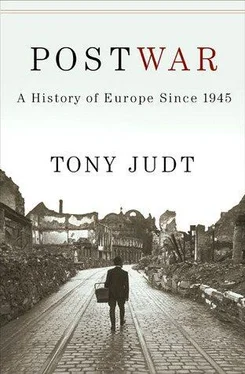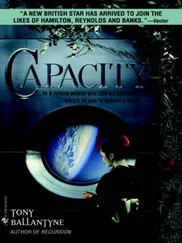But the net effect of these encouragements was to pour further humiliation upon an already humbled nation. And the French responded at first with predictable prickliness. On the Allied Control Council in Germany they consistently blocked or vetoed the implementation of decisions taken at the Potsdam Conference of the Big Three on the grounds that France had not been party to them. The French provisional authorities initially refused to cooperate with UNRRA and Allied military governments in the handling of displaced persons on the grounds that French refugees and DPs should be located and administered as part of an independent and exclusively French operation.
Above all, French post-war governments felt very strongly their sense of exclusion from the highest councils of Allied decision-making. The British and the Americans were not to be trusted separately, they thought (remembering the American retreat from Europe after 1920 and the July 1940 British destruction of the French fleet at Mers-el-Kebir); but above all they were not to be trusted together—a sentiment felt especially acutely by De Gaulle, haunted by recollections of his demeaning wartime status as a guest in London and his low standing in the eyes of FDR. Decisions were being taken in Washington and London, the French came to believe, that directly concerned them but over which they had no influence
Like Britain, France was an Empire, at least on paper. But Paris had become estranged from its colonial holdings in the course of the occupation. In any case, and despite the country’s significant possessions in Africa and South-East Asia, France was first and always a continental power. Soviet moves in Asia, or the coming crisis in the Middle East, were matters with which the French, unlike the British, were by now only indirectly concerned. Precisely because France was now shrunk, Europe loomed larger in its field of vision. And in Europe, Paris had grounds for concern. French influence in eastern Europe, an arena where French diplomacy had been most active between the wars, was finished: in October 1938 a shell-shocked Edouard Benes famously confided that his ‘great mistake before History…will have been my fidelity to France’, and his disillusion was widespread in the region.
France’s attention was now fixed, indeed fixated, upon Germany. This was not unreasonable: between 1814 and 1940 French soil had been invaded and occupied by Germans on five distinct occasions, three of them within living memory. The country had paid an incalculable price in territorial and material loss and in human lives and suffering. The failure after 1918 to put in place a system of controls and alliances capable of restraining a renascent, vengeful Germany haunted the Quai d’Orsay, home of the French Foreign Ministry. The country’s first priority after the defeat of Hitler was to ensure that this mistake was not repeated.
Thus France’s initial position on the German problem was very clear, and drew directly upon the lessons of 1918-24: so much so, indeed, that to outsiders it appeared an attempt to re-run the script of the post-World War One years, only this time with someone else’s army. What French policy makers sought was the complete disarmament and economic dismantling of Germany: arms and arms-related production were to be prohibited, reparations were to be made (including obligatory labour service in France for German workers), agricultural produce, timber, coal and machinery were to be requisitioned and removed. The mining districts of the Ruhr, the Saarland and parts of the Rhineland should be separated from the German state, their resources and output placed at French disposal.
Such a schedule, had it been imposed, would surely have destroyed Germany for many years to come: that was its half-acknowledged object (and an attractive political programme in France). But it would also have served the purpose of placing Germany’s huge primary resources at the service of France’s own plans for recovery—indeed, the Monnet Plan presumed the availability of German coal deliveries in particular, without which the French steel industry was helpless. Even in 1938 France had been the world’s biggest importer of coal, buying from abroad some 40 percent of its requirements in coal and coke. By 1944 French domestic coal output had fallen to less than half that of 1938. The country was even more dependent upon foreign coal. But in 1946, when domestic coal production regained 1938 levels, French coal imports—at 10 million tons—were still desperately short of the required amounts. Without German coal and coke, the post-war French recovery would be stillborn.
There were, however, a number of shortcomings to French calculations. In the first place they fell foul of the same objections raised by Keynes to French policy a quarter century earlier. It made little sense to destroy German resources if they were vital to France’s own recovery; and there was simply no way to oblige Germans to work for France while being held down to a low standard of living at home with little prospect for improvement. The risk of provoking a nationalist backlash in Germany against post-war foreign oppression appeared at least as great in the 1940s as it had twenty years earlier.
But the most serious objection to French plans for post-war Germany was that they took little account of the interests or plans of France’s Western allies, an imprudent oversight at a time when France was utterly dependent on those same allies not just for her security but for her very livelihood. On secondary issues—such as a customs and monetary union with the Saarland, on which the French got their way in 1947—the Western Allies could accommodate French demands. But on the central issue of Germany’s future, Paris had no leverage with which to oblige the ‘Anglo-Americans’ to do its bidding.
France’s relationship with the Soviet Union was a little different. France and Russia had been in and out of alliances together for the past half century and Russia still held a special place in French public affection: opinion polls in post-war France consistently revealed a substantial reserve of sympathy for the Soviet Union. [25] In February 1945, when asked who would do most to help France recover, 25 percent of those polled said the USSR, 24 percent the USA.
French diplomats in the aftermath of German defeat could thus hope that a natural concordance of interests—shared fear of Germany and suspicion of the ‘Anglo-Americans’—might translate into sustained Soviet support for French diplomatic goals. Like Churchill, De Gaulle thought and spoke of the USSR as ‘Russia’ and reasoned in grand historical analogies: on his way to Moscow in December 1944, to negotiate a rather meaningless Franco-Russian Treaty against any revival of German aggression, the French leader observed to his entourage that he was dealing with Stalin as François I ehad with Suleiman the Magnificent four centuries earlier: with the difference ‘that in sixteenth-century France there wasn’t a Muslim party’.
Stalin, however, did not share French illusions. He had no interest in serving as a counterweight to assist the French in offsetting the foreign policy heft of London and Washington, though this was only finally made clear to the French in April 1947, at the Moscow gathering of Allied foreign ministers, when Molotov refused to back Georges Bidault’s proposals for a separate Rhineland and foreign control of the Ruhr industrial belt. Yet the French continued to dream up alternative ways to secure an impossible independence of policy. There were aborted negotiations with Czechoslovakia and Poland aimed at securing coal and markets for French steel and farm produce. And the French Ministry of War could—confidentially—propose, as late as 1947, that France should adopt a stance of international neutrality, making preventive ententes or alliances with the USA and the USSR and lining up against whichever of the two initiated aggression against her.
Читать дальше












